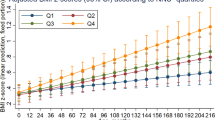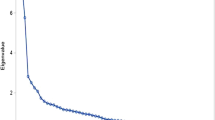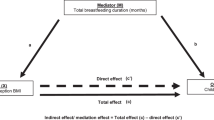Abstract
Background
Parental obesity is linked to offspring obesity, though little research has explored factors that might influence this relationship during the complementary feeding period. This study investigated whether infant intakes of added sugars mediate the relationship between a mother’s pre-pregnancy body mass index (BMI) and infant rapid weight gain (defined as upward weight-for-age percentile crossing).
Methods
This study was of a cross-sectional design. Anthropometrics for 141 mother-infant dyads (mean age [standard deviation]: 32.6 [4.4] year for mothers, 11.9 [1.9] months for infants) were obtained. Data from three 24-h recalls pertaining to the infants’ diets were collected and analyzed. Pearson product-moment correlations and multivariable regressions assessed bivariate relationships between pre-pregnancy BMI, infant added sugar intakes and upward weight-for-age percentile crossing. Mediation models evaluated the effects of added sugars and breastfeeding duration.
Results
Pre-pregnancy BMI correlated positively with infants’ added sugar intakes (r = 0.230, p = 0.006). Added sugar intakes mediated the impact of pre-pregnancy BMI on upward weight-for-age percentile crossing (indirect effect = 0.007, 95% CI = 0.0001, 0.0197, indirect/total effect ratio = 0.280). Breastfeeding duration also moderated the relationship, with infants who were breastfed for a shorter duration experiencing a greater mediating effect (indirect effect = 0.010, 95% CI = 0.0014, 0.0277, indirect/direct effect ratio = 0.7368).
Conclusions
Mothers who were overweight or obese prior to pregnancy were significantly more likely to give their infants foods and beverages with added sugars, and this practice was found to mediate the relationship between maternal and infant obesity. Breastfeeding duration moderated the mediating effect of added sugars between pre-pregnancy BMI and infant rapid weight gain.
This is a preview of subscription content, access via your institution
Access options
Subscribe to this journal
Receive 12 print issues and online access
$259.00 per year
only $21.58 per issue
Buy this article
- Purchase on Springer Link
- Instant access to full article PDF
Prices may be subject to local taxes which are calculated during checkout


Similar content being viewed by others
References
Fryar CD, Carroll MD, Afful J. Prevalence of high weight-for-recumbent length among infants and toddlers from birth to 24 months of age: United States, 1971–1974 through 2017–2018. NCHS Health E-Stats. 2020.
Zheng M, Lamb KE, Grimes C, Laws R, Bolton K, Ong KK, et al. Rapid weight gain during infancy and subsequent adiposity: a systematic review and meta-analysis of evidence. Obes Rev. 2018;19:321–32.
Leunissen RWJ, Kerkhof GF, Stijnen T, Hokken-Koelega A. Timing and tempo of first-year rapid growth in relation to cardiovascular and metabolic risk profile in early adulthood. JAMA. 2009;301:2234–42.
Kramer MS, Barr RG, Leduc DG, Boisjoly C, McVey-White L, Pless IB. Determinants of weight and adiposity in the first year of life. J Pediatr. 1985;106:10–4.
Kral TVE, Rauh EM. Eating behaviors of children in the context of their family environment. Physiol Behav. 2010;100:567–73.
Li R, Jewell S, Grummer-Strawn L. Maternal obesity and breast-feeding practices. Am J Clin Nutr. 2003;77:931–6.
Mäkelä J, Vaarno J, Kaljonen A, Niinikoski H, Lagström H. Maternal overweight impacts infant feeding patterns-the STEPS Study. Eur J Clin Nutr. 2014;68:43–9.
Baker JL, Michaelsen KF, Rasmussen KM, Sørensen TI. Maternal prepregnant body mass index, duration of breastfeeding, and timing of complementary food introduction are associated with infant weight gain. Am J Cin Nutr. 2004;80:1579–88.
Rising R, Lifshitz F. Relationship between maternal obesity and infant feeding-interactions. Nutr J. 2005;4:17.
Brekke HK, van Odijk J, Ludvigsson J. Predictors and dietary consequences of frequent intake of high-sugar, low-nutrient foods in 1-year-old children participating in the ABIS study. Br J Nutr. 2007;97:176–81.
United States Food and Drug Administration. Added sugars on the new nutrition facts label: U.S. Department of Health and HumanServices. 2020. https://www.fda.gov/food/new-nutrition-facts-label/added-sugars-new-nutrition-facts-label.
Lumeng JC, Taveras EM, Birch L, Yanovski SZ. Prevention of obesity in infancy and early childhood: a National Institutes of Health workshop. JAMA Pediatr. 2015;169:484–90.
Food and Nutrition Service. Pregnancy and Birth to 24 Months: U.S. Department of Agriculture. 2019. https://www.fns.usda.gov/resource/pregnancy-and-birth-24-months.
Te Morenga L, Mallard S, Mann J. Dietary sugars and body weight: systematic review and meta-analyses of randomised controlled trials and cohort studies. Br Med J. 2013;346:e7492.
Malik VS, Pan A, Willett WC, Hu FB. Sugar-sweetened beverages and weight gain in children and adults: a systematic review and meta-analysis. Am J Clin Nutr. 2013;98:1084–102.
Luger M, Lafontan M, Bes-Rastrollo M, Winzer E, Yumuk V, Farpour-Lambert N. Sugar-sweetened beverages and weight gain in children and adults: a systematic review from 2013 to 2015 and a comparison with previous studies. Obes Facts. 2017;10:674–93.
Kong K, Burgess, B, Morris, KS, Faith, MS, Paluch, RA. High intake of added sugars is linked to rapid weight gain in infancy, breastfeeding ≥12 months may protect against this: a preliminary investigation. Pediatr Obes. 2021;16:e12728.
Bell KA, Wagner CL, Feldman HA, Shypailo RJ, Belfort MB. Associations of infant feeding with trajectories of body composition and growth. Am J Clin Nutr. 2017;106:491–8.
von Kries R, Koletzko B, Sauerwald T, von Mutius E, Barnert D, Grunert V, et al. Breast feeding and obesity: cross sectional study. BMJ. 1999;319:147–50.
Li C, Goran MI, Kaur H, Nollen N, Ahluwalia JS. Developmental trajectories of overweight during childhood: role of early life factors. Obesity. 2007;15:760–71.
Yan J, Liu L, Zhu Y, Huang G, Wang PP. The association between breastfeeding and childhood obesity: a meta-analysis. BMC Public Health. 2014;14:1267.
Harder T, Bergmann R, Kallischnigg G, Plagemann A. Duration of breastfeeding and risk of overweight: a meta-analysis. Am J Epidemiol. 2005;162:397–403.
Owen CG, Martin RM, Whincup PH, Smith GD, Cook DG. Effect of infant feeding on the risk of obesity across the life course: a quantitative review of published evidence. Pediatrics. 2005;115:1367–77.
Dewey KG. Is breastfeeding protective against child obesity? J Hum Lact. 2003;19:9–18.
Carling SJ, Demment MM, Kjolhede CL, Olson CM. Breastfeeding duration and weight gain trajectory in infancy. Pediatrics. 2015;135:111–9.
Institute of Medicine. Dietary reference intakes for energy, carbohydrate, fiber, fat, fatty acids, cholesterol, protein, and amino acids. Washington (DC): National Academy Press. 2005. https://doi.org/10.17226/10490.
Fein SB, Labiner-Wolfe J, Shealy KR, Li R, Chen J, Grummer-Strawn LM. Infant feeding practices study II: Study methods. Pediatrics. 2008;122:S28–S35. Suppl 2
de Onis M, Onyango AW, Van den Broeck J, Chumlea WC, Martorell R. Measurement and standardization protocols for anthropometry used in the construction of a new international growth reference. Food Nutr Bull. 2004;25:s27–36.
WHO Multicentre Growth Reference Study Group. WHO child growth standards based on length/height, weight and age. Acta Paediatr Suppl. 2006;450:76–85.
Ekelund U, Ong K, Linne Y, Neovius M, Brage S, Dunger DB, et al. Upward weight percentile crossing in infancy and early childhood independently predicts fat mass in young adults: the Stockholm Weight Development Study (SWEDES). Am J Clin Nutr. 2006;83:324–30.
Anater AS, Catellier DJ, Levine BA, Krotki KP, Jacquier EF, Eldridge AL, et al. The feeding infants and toddlers study (FITS) 2016: study design and methods. J Nutr. 2018;148:1516S–24S. suppl_3
Raper N, Perloff B, Ingwersen L, Steinfeldt L, Anand J. An overview of USDA’s dietary intake data system. J Food Compos Anal. 2004;17:545–55.
Ziegler P, Briefel R, Clusen N, Devaney B. Feeding infants and toddlers study (FITS): development of the FITS survey in comparison to other dietary survey methods. J Am Diet Assoc. 2006;106:12. e1–e50.
Herrick KA, Fryar CD, Hamner HC, Park S, Ogden CL. Added sugars intake among US infants and toddlers. J Acad Nutr Diet. 2020;120:23–32.
Preacher KJ, Hayes AF. SPSS and SAS procedures for estimating indirect effects in simple mediation models. Behav Res Methods Instrum Comput. 2004;36:717–31.
Hayes AF. Methodology in The Social Science: Introduction to mediation, moderation, and conditional process analysis: a regression-based approach. New York, NY, US: Guilford Press, 2013.
Ezzati M, Vander Hoorn S, Lawes CM, Leach R, James WPT, Lopez AD, et al. Rethinking the “diseases of affluence” paradigm: global patterns of nutritional risks in relation to economic development. PLoS Med. 2005;2:e133.
Institute of Medicine (US) and National Research Council (US) Committee to Reexamine IOM Pregnancy Weight Guidelines. The National Academies Collection: reports funded by National Institutes of Health. In: Rasmussen KM, Yaktine AL (eds). Weight Gain During Pregnancy: Reexamining the Guidelines. Washington (DC): National Academy of Sciences. 2009.
Liu T, Mueller N, Benjamin-Neelon S. Identifying mediators underlying the intergenerational cycle of obesity: a causal mediation analysis. Curr Dev Nutr. 2020;4:1655.
Adane AA, Tooth LR, Mishra GD. The role of offspring’s birthweight on the association between pre-pregnancy obesity and offspring’s childhood anthropometrics: a mediation analysis. J Dev Orig Health Dis. 2019;10:570–7.
Stevens DR, Neelon B, Roberts JR, Taylor SN, Newman RB, Vena JE, et al. Mediation of the association between maternal pre-pregnancy overweight/obesity and childhood overweight/obesity by birth anthropometry. J Dev Orig Health Dis. 2021;12:71–8.
Tun HM, Bridgman SL, Chari R, Field CJ, Guttman DS, Becker AB, et al. Roles of birth mode and infant gut microbiota in intergenerational transmission of overweight and obesity from mother to offspring. JAMA Pediatr. 2018;172:368–77.
Llewellyn C, Wardle J. Behavioral susceptibility to obesity: gene-environment interplay in the development of weight. Physiol Behav. 2015;152:494–501.
Llewellyn CH, Fildes A. Behavioural susceptibility theory: professor jane wardle and the role of appetite in genetic risk of obesity. Curr Obes Rep. 2017;6:38–45.
Carnell S, Wardle J. Appetitive traits in children. New evidence for associations with weight and a common, obesity-associated genetic variant. Appetite. 2009;53:260–3.
Frick PJ, Ray JV, Thornton LC, Kahn RE. Annual research review: a developmental psychopathology approach to understanding callous‐unemotional traits in children and adolescents with serious conduct problems. J Child Psychol Psychiatry. 2014;55:532–48.
Ma Y, Olendzki BC, Pagoto SL, Hurley TG, Magner RP, Ockene IS, et al. Number of 24-hour diet recalls needed to estimate energy intake. Ann Epidemiol. 2009;19:553–9.
Fisher JO, Butte NF, Mendoza PM, Wilson TA, Hodges EA, Reidy KC, et al. Overestimation of infant and toddler energy intake by 24-h recall compared with weighed food records. Am J Clin Nutr. 2008;88:407–15.
Rowland ML. Self-reported weight and height. Am J Clin Nutr. 1990;52:1125–33.
Natamba BK, Sanchez SE, Gelaye B, Williams MA. Concordance between self-reported pre-pregnancy body mass index (BMI) and BMI measured at the first prenatal study contact. BMC Pregnancy Childbirth. 2016;16:187.
Han E, Abrams B, Sridhar S, Xu F, Hedderson M. Validity of self-reported pre-pregnancy weight and body mass index classification in an integrated health care delivery system. Paediatr Perinatal Epidemiol. 2016;30:314–9.
Taveras EM, Rifas-Shiman SL, Sherry B, Oken E, Haines J, Kleinman K, et al. Crossing growth percentiles in infancy and risk of obesity in childhood. Arch Pediatr Adolesc Med. 2011;165:993–8.
Kuehn B. Breastfeeding report card. JAMA. 2018;320:1426.
Acknowledgements
All authors thank the families who participated in this study and the research staff responsible for the data collection and nutritional analyses.
Funding
This work was funded by the National Institute on Child Health and Human Development of the National Institutes of Health, grant number R01 HD087082-01 (awarded to Kai Ling Kong). The sponsor had no role in the study design, data collection, analysis and interpretation, writing of the report, or decision to submit the manuscript for publication.
Author information
Authors and Affiliations
Contributions
BB initiated the research question, assisted with the results’ interpretation, drafted the manuscript, and approved the final manuscript as submitted; KM assisted with all aspects of the data collection, conducted training for all the research staff members and dietetic interns, quality-controlled all dietary recalls and nutritional analyses, and revised and approved the final manuscript as submitted; MF assisted with the research question, interpreted the results, revised the manuscript, and approved the final manuscript as submitted; RP contributed to the data analyses, interpreted the results, and revised and approved the final manuscript as submitted; KK initiated and developed the research question and study design, led the analytic plan, drafted the manuscript, and approved the final manuscript as submitted.
Corresponding author
Ethics declarations
Competing interests
The authors declare no competing interests.
Additional information
Publisher’s note Springer Nature remains neutral with regard to jurisdictional claims in published maps and institutional affiliations.
Supplementary information
Rights and permissions
About this article
Cite this article
Burgess, B., Morris, K.S., Faith, M.S. et al. Added sugars mediate the relation between pre-pregnancy BMI and infant rapid weight gain: a preliminary study. Int J Obes 45, 2570–2576 (2021). https://doi.org/10.1038/s41366-021-00936-w
Received:
Revised:
Accepted:
Published:
Issue Date:
DOI: https://doi.org/10.1038/s41366-021-00936-w
This article is cited by
-
Understanding the pathways between prenatal and postnatal factors and overweight outcomes in early childhood: a pooled analysis of seven cohorts
International Journal of Obesity (2023)



